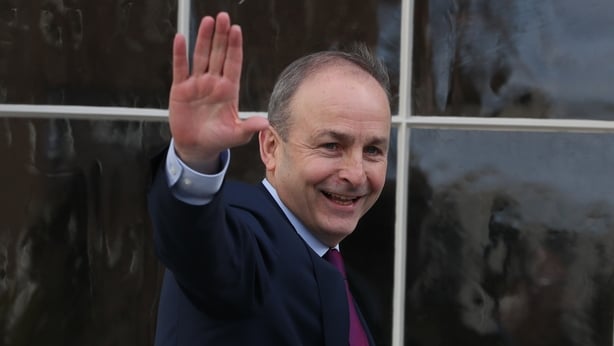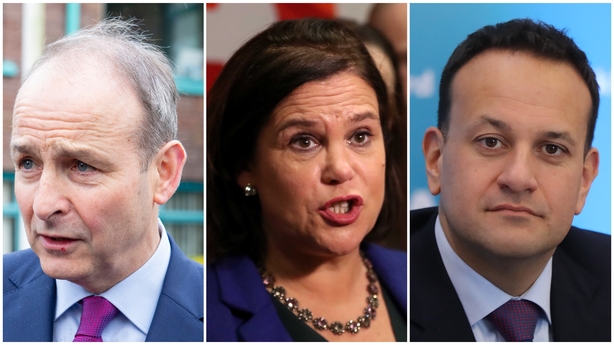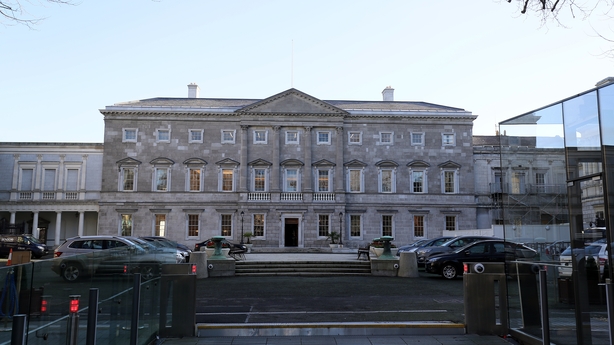In the early years of this century I was several times deployed by a newspaper to work at major race meetings.
Places like Cheltenham, Galway and Listowel became familiar as I was tasked with observing and recording politicians in this milieu.
Back then it was almost obligatory for an ambitious minister or TD to be seen in these places.
Little of what I saw then has any direct links with the political predicament served up by the recent General Election result.
But I do recall the equanimity of some people, not politicians, as the big race of the day reached its crucial stage.
It was a feat made all the more remarkable given the huge amounts of money they had handed over in the betting ring moments earlier.
As I listened to Micheál Martin set out his pitch with glistening clarity to Seán O'Rourke on Thursday, I recalled the calmness of those who watched their horse, far from perfectly positioned, as it approached the hill on the run to the finish line in Galway.

Whatever political capital Micheál Martin retains, he has staked it on a coalition with Fine Gael. Even the idea of a rotating Taoiseach is on the table.
If you'll allow me one last racing metaphor, there are no each way bets here.
By early Thursday afternoon those in Fianna Fáil knew that the party leader had on radio effectively set the agenda for the day’s parliamentary meeting.
Most heard his interview although a few spent the drive to Leinster House sorting out constituency issues on their hands-free phones.
They had been given an unambiguous signal the night before at any rate.
Then Michael McGrath had stated on the Six One News that the party stood ready to take the next step.
The juxtaposing of that statement with Fine Gael's Paschal Donohoe's more aloof assessment of the policy meeting between the parties alarmed some Fianna Fáil TDs.
"I don't know how Michael McGrath can go and speak for the whole party," said one on Wednesday evening.
Phone calls flowed between TDs and many feared Fianna Fáil was beginning to look desperate.
"They (FG) are not really interested," concluded one on Wednesday night.
All the while a small number wondered if some sort of talks with Sinn Féin were in any way still feasible?
But those in prominent positions in the party believe any move in this direction would precipitate a major split in Fianna Fáil.
That does not however diminish the sense of unease felt by many in the party about this entire subject.
Particularly the sustained attacks by Micheál Martin on Sinn Féin, when a number of TDs believe it was an incorrect strategy to pursue in the first place.

This is made all the more relevant given the suggested surge in Sinn Féin support according to the first opinion poll since the general election.
Crucially too, this is the point in the political cycle were party councillors are more influential.
This is because Seanad candidates are knocking on their doors seeking votes.
Therefore concerns, which at other times may get nothing more than a sympathetic ear, are now elevated to the highest echelons of the party.
Hence the questioning on Thursday of the Fianna Fáil leader's stance on Sinn Féin coupled with those calls for a comprehensive review of the party's structures in the aftermath of the poor election result.
This could be viewed as a veiled verdict being delivered on the party leader’s tactical abilities.
Up to this point some TDs were often unhappy with Micheál Martin but they believed he was a capable strategist. Many of them no longer share this view.
The questions at Thursday’s meeting are said to have surprised Mr Martin, he had after all repeatedly stated that his parliamentary party endorsed the decision not to talk to Sinn Féin.
Despite this dissent his response was described as impressively robust.
Another question arises however from all this, could it spook Fine Gael?
The party is understood to have some lingering worries about what it fears is a latent desire in parts of Fianna Fáil to form a government with Sinn Féin.
Generally, though, many Fine Gael TDs privately concede that a coalition involving themselves and Fianna Fáil is looking more likely.
Fianna Fáil’s enormous eagerness to join forces is also being viewed with no little hilarity by some in Fine Gael.
The longer this feat of political alchemy takes to complete the better is the feeling among some of them. This would allow the party membership time to digest this significant change.

But there is also a realisation that the fast changing circumstances triggered by spread of the coronavirus may accelerate the process.
Indeed it could provide a degree of political cover and help placate the large numbers in both parties that would vociferously seek to oppose it.
Central to all this, even if a significant group of Independent TDs now look like they may join a Fianna Fáil and Fine Gael coalition, is the Green Party.
Can that party compromise on some of its key demands to allow an agreed Programme for Government to emerge?
And then there is the further question, would such a proposal be acceptable to the required two thirds of the party’s membership at a special conference?
If the answer to all these questions is yes, it could all mean that Micheál Martin would ironically become Taoiseach at his weakest moment politically.







